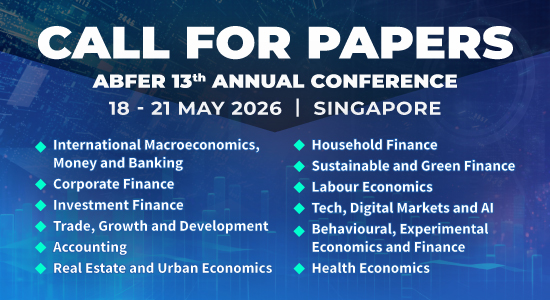Call for Papers
The Asian Bureau of Finance and Economic Research will be holding its 13th Annual Conference on 18-21 May 2026 at Conrad Singapore Orchard.
Conference Organization
The four days conference consists of 12 programs and each program will meet for two or three sessions. Three papers will be presented for each session with assigned discussants and time for open discussion.
- International Macroeconomics, Money & Banking
- Corporate Finance
- Investment Finance
- Trade, Growth and Development
- Accounting
- Real Estate and Urban Economics (Joint with IREUS)
- Household Finance (Joint with IREUS)
- Sustainable and Green Finance (Joint with SGFIN)
- Labour Economics
- Tech, Digital Markets and AI (Joint with GIFTS, SEA and SKBI)
- Behavioural, Experimental Economics and Finance (Joint with HKUST) - New
- Health Economics (Joint with NTU Singapore) - New
Programs will run in parallel at any one time. One author is required to attend and present if the paper is selected. Some of the presented papers will be summarized in the ABFER Research Digest.
Daily Schedule
| 8:30 am - 9:00 am | Registration |
| 9:00 am - 12:30 pm | Workshop Programs (includes 30 minutes break) |
| 12:30 pm - 2:00 pm | Lunch |
| 2:00 pm - 5:30 pm | Workshop Programs (includes 30 minutes break) |
Related events such as industry roundtables, academia panels, master class and talks by distinguished speakers will be organised. Please refer to the conference program.
Topics of Interest
 |
For the program of International Macroeconomics, Money & Banking, we are interested in a variety of topics, including (but not limited to): central banking, exchange rates, financial crises, financial risk management, foreign direct investment, international capital flows, macroeconomic policy, monetary and fiscal policy, prudential regulation, systemic risk and other international macroeconomics and money and banking topics, particularly those of relevance to Asia. Program Directors:
|
 |
For the program in Corporate Finance, we are interested in all topics relevant to Asian firms, markets, or regulators - even if Asian data are not used. Past years' presentations have explored behavioural corporate finance, business groups, capital investment, capital structure, comparative corporate finance, corporate governance, dividends, financial development, law and finance, mergers and acquisitions, multinationals, ownership structure, tunneling, corporate innovation, fintech, climate risk, and other areas of research. Program Directors:
|
 |
For the program of Investment Finance, we are interested in a variety of topics, including, but not limited to: asset allocation, asset returns, behavioural finance, financial technology, institutional investment management, market efficiency, market microstructure, market timing, portfolio management, sovereign wealth funds, and other investment finance topics relevant to Asia. Program Directors:
|
 |
For the program of Trade, Growth and Development, we will consider any paper under this general theme, which is broadly interpreted. For example, interesting papers related to applied micro, political economy, and structural transformation in developing countries will also be considered. We welcome both applied theory and empirical papers. Program Directors:
|
 |
For the Accounting program, we are interested in accounting topics including but not limited to: the determinants and consequences of managers’ corporate financial reporting and disclosure decisions; the role of accounting information within organizations, including compensation; external auditing; the role of accounting in corporate governance; the effect of taxes on management decisions; the role of regulation in accounting and auditing practice. Ideally papers address these issues using data drawn from the Asia Pacific region or having direct relevance for this region. Program Directors:
|
 |
Real Estate is closely intertwined with the disciplines of macroeconomics, investment finance, and household finance. The Real Estate and Urban Economics program welcomes submissions of theoretical, empirical, and policy research in real estate finance, housing and urban economics, which include, but are not limited to, housing price and housing affordability; sustainable development issues; discrimination, disparities, and diversity in housing and real estate markets (e.g., mortgage lending, residential development); climate risks and real estate asset market implications; finance green and sustainable development; household finance; securitization and real estate capital markets; commercial real estate finance and investment; PERE and REITs; etc. Program Directors:
|
 |
Household Finance program encompasses topics on (1) how households make financial decisions relating to the functions of saving, consumption, investment, housing, payment, borrowing and risk management, (2) how organizations provide products and services to satisfy these financial functions, and (3) how interventions by firms, governments and other parties affect the provision of financial services. The scope of household finance spans multi disciplines, embracing not just finance and economics but also industrial organization, law, psychology and sociology. We welcome both applied and theoretical papers in this area. Program Directors:
Conference Organizers:
|
 |
Sustainable and Green Finance program encompasses various topics related to how sustainability has become an important issue for companies, investors, financial intermediaries, and capital markets. Climate change and the corresponding regulatory initiatives and frameworks pose serious challenges for commercial operations in many industry sectors, and consequently financial intermediaries and capital markets. Understanding the sustainability of businesses and industries in this dynamic environment is vital for financial entities in order to assess and efficiently price these exposures. Innovations in green finance can also play a role in enhancing the sustainability of commercial operations. The development in sustainable and green finance relies on various disciplines beyond finance and economics, including natural sciences, law, geography, design, engineering, and computing. We welcome both applied and theoretical papers in this area. Program Directors:
|
 |
For the program in Labour Economics, we are interested in labour-related topics, including, but not limited to issues related to employment, labour in the global economy, workplace health and safety, and other labour trends (e.g. an ageing and multi-generational workforce, gender, skills-based employment, mental well-being at work, technology bifurcation, and hybrid work). We especially welcome papers with public policy relevance. Program Directors:
|
 |
For the program in Tech, Digital Markets, and AI, we are interested in research that explores the transformative impact of digital technologies and artificial intelligence on innovation, science and research, productivity, labor markets, competition, finance, and management systems. Topics of interest include the economics of AI and Web3, AI for social sciences, AI-driven decision-making, foundational models, AI ethics, copyrights, and alignment, FinTech, blockchain applications, crypto assets, decentralized finance, the data economy, digital platforms, digital finance, digital privacy, and tech innovations. We welcome papers that advance fundamental research in economics, finance, and other fields, offering actionable insights for practitioners, addressing regulatory challenges, or applying and customizing emerging technologies in these fields, or analyzing their socioeconomic implications. Contributions that combine theoretical frameworks with empirical analysis, create interdisciplinary knowledge, bear relevance for Asian economies, or provide novel methodologies are particularly encouraged. Program Directors:
|
 |
Behavioural, Experimental Economics and Finance is a dynamic and rapidly evolving field that enriches our understanding of economic behaviour and financial markets by integrating insights from psychology and social sciences, and by employing diverse methodologies, including theoretical, empirical, and experimental approaches. By directly confronting the gap between theoretical models and real-world human behaviour, this field offers powerful tools for explaining and predicting outcomes that traditional approaches often overlook. We welcome submissions addressing a wide range of topics, including (but not limited to) belief formation, nonstandard preferences, consumption and saving behaviour, investor decision-making, money management, asset pricing anomalies, corporate investment choices, the influence of social media and networks, policy design and evaluation, as well as emerging applications of AI and machine learning. Program Directors:
|
 |
Health Economics welcomes papers that address the issues of health systems in Asia-Pacific region, including but not limited to topics such as: (a) Long Term Care, Aging & Demography; (b) Health Equity; (c) Health & Development; (d) Demand for and Effect of Health Insurance; (e) Financing of Technological Innovations through Government Funding and Insurance; (f) Physician Behaviour and Health Outcomes. We also welcome submissions that critically analyse the value of healthcare interventions and innovations from the societal perspective, including but not limited to topics such as: (a) Health and Economic Benefits of Investment in Health Care Technology Innovations; (b) Competition in Health Care Markets (c) Consumer Decision-Making in Health Care; (d) Prescription Drugs; (e) Effects of Government Procurement on Drugs and Medical Devices; (f) Role of AI in Medical Innovations; (g) Role of AI in Health and Long-Term Care. Program Directors and Conference Organizers:
|
Timeline
| Submission Deadline | 15 January 2026 |
|---|---|
| Paper Selection by | 15 February 2026 |
| Discussant Selection by | 1 March 2026 |
| Schedule Completion by | 15 March 2026 |
Things to Note
- We encourage submissions from early-career scholars and researchers, and those who are not affiliated with ABFER.
- Please feel free to submit work which will be considered for review/publication elsewhere.
- You may submit a single paper to two or more programs if the research is relevant to each program.
- Please include the full list of authors in your paper.
- There will be no conference volume.
- Presented papers will remain accessible on ABFER website.
- ABFER will provide sponsorship (with cap) strictly for one author and one discussant per paper.
- The sponsorship is applicable only for overseas delegate and will be reimbursed after the conference.
- Conference fee will be waived for presenters and discussants.
- Only those who are selected as presenters, discussants, or panellists will be notified.
Interest to Attend
- If you are interested to attend the conference, please visit this page.
Electronic Submission
Submission has closed


